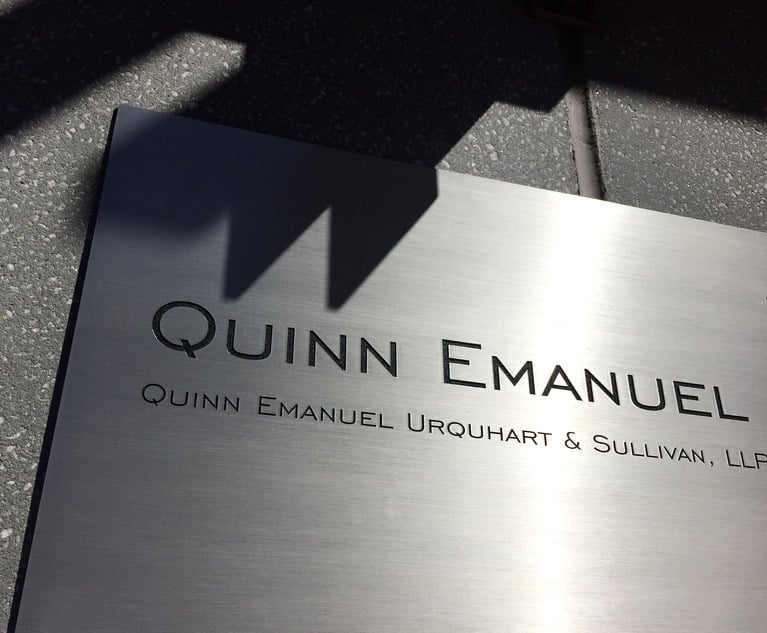Norton Rose Fulbright, Lefosse Advise on Biofuels JV in Brazil
BP Bunge Bioenergia becomes the world's second-biggest producer of sugarcane ethanol.
December 10, 2019 at 06:44 PM
3 minute read
 Sugarcane / Photo by Shutterstock.com
Sugarcane / Photo by Shutterstock.com
Norton Rose Fulbright and Lefosse Advogados have advised on a Brazilian bioenergy joint venture between oil heavyweight BP and agricultural giant Bunge, as major oil companies deepen their investments in ethanol.
The firms combined their Brazilian bioenergy and sugarcane ethanol businesses to create BP Bunge Bioenergia, the world's second-largest operator by effective crushing capacity in the bioethanol market.
Lefosse lawyers Christian Roschmann, José Carlos Berardo, Renata Cardoso, Andrea Caliento, and Bruno Carramaschi advised Bunge from São Paulo. The London-based Norton Rose Fulbright team included corporate partners Chris Grieves and Hussain Kubba, with competition advice from partner Ian Giles.
The joint venture absorbed $700 million of Bunge debt, while the Brazilian firm also received $75 million from BP to reduce outstanding debt. BP was also advised in Brazil by Mattos Filho, Veiga Filho, Marrey Jr e Quiroga Advogados.
The 50-50 joint venture will manage 11 plants in five Brazilian states with a total capacity to crush 32 million tons of sugarcane per year. It ranks only behind Raízen, the joint venture between Royal Dutch Shell Plc and Brazilian energy group Cosan.
"Combining 11 mills located in an area the size of Europe, and negotiating transaction documentation consisting of a complex business combination agreement with a highly sophisticated risk allocation mechanism, a shareholders' agreement with complex governance structure and voting agreements with two different law firms representing a highly sophisticated and experienced BP in-house M&A and legal team was quite a challenge," said Lefosse partner Christian Roschmann.
Clinching regulatory approval in Brazil was fairly easy, said Roschmann, as there are many sugar and ethanol producers in the country. However, antitrust authorities in China and Turkey, which import sugar from Brazil, took further persuasion.
Ethanol produced from sugarcane is one of the most carbon-efficient biofuels available globally, with lifecycle greenhouse gas emissions about 70% lower than conventional hydrocarbon transport fuels.
Brazil is the world's second-largest and most integrated market for ethanol as a transportation fuel, with demand forecast to grow rapidly. The majority of vehicles in Brazil – about 70% – are already able to run on ethanol, and it is estimated that the country's demand for ethanol will increase by about 70% in the next 10 years.
The BP Bunge Bioenergia joint venture will have the flexibility to produce a mix of ethanol and sugar. It will also generate renewable electricity through its cogeneration facilities, fuelled by waste biomass from the sugarcane, to power all its sites and sell surplus electricity to the Brazilian power grid.
Norton Rose Fulbright described the BP and Bunge assets as largely complementary, with sites in five Brazilian states, including three in the key region of São Paulo.
This content has been archived. It is available through our partners, LexisNexis® and Bloomberg Law.
To view this content, please continue to their sites.
Not a Lexis Subscriber?
Subscribe Now
Not a Bloomberg Law Subscriber?
Subscribe Now
NOT FOR REPRINT
© 2025 ALM Global, LLC, All Rights Reserved. Request academic re-use from www.copyright.com. All other uses, submit a request to [email protected]. For more information visit Asset & Logo Licensing.
You Might Like
View All
X Ordered to Release Data by German Court Amid Election Interference Concerns

Quinn Emanuel's Hamburg Managing Partner and Four-Lawyer Team Jump to Willkie Farr

Trump ICC Sanctions Condemned as ‘Brazen Attack’ on International Law

U.S.- China Trade War: Lawyers Label WTO Dispute Pointless, Clients Have Their Hands Tied
Law Firms Mentioned
Trending Stories
- 1States Accuse Trump of Thwarting Court's Funding Restoration Order
- 2Microsoft Becomes Latest Tech Company to Face Claims of Stealing Marketing Commissions From Influencers
- 3Coral Gables Attorney Busted for Stalking Lawyer
- 4Trump's DOJ Delays Releasing Jan. 6 FBI Agents List Under Consent Order
- 5Securities Report Says That 2024 Settlements Passed a Total of $5.2B
Who Got The Work
J. Brugh Lower of Gibbons has entered an appearance for industrial equipment supplier Devco Corporation in a pending trademark infringement lawsuit. The suit, accusing the defendant of selling knock-off Graco products, was filed Dec. 18 in New Jersey District Court by Rivkin Radler on behalf of Graco Inc. and Graco Minnesota. The case, assigned to U.S. District Judge Zahid N. Quraishi, is 3:24-cv-11294, Graco Inc. et al v. Devco Corporation.
Who Got The Work
Rebecca Maller-Stein and Kent A. Yalowitz of Arnold & Porter Kaye Scholer have entered their appearances for Hanaco Venture Capital and its executives, Lior Prosor and David Frankel, in a pending securities lawsuit. The action, filed on Dec. 24 in New York Southern District Court by Zell, Aron & Co. on behalf of Goldeneye Advisors, accuses the defendants of negligently and fraudulently managing the plaintiff's $1 million investment. The case, assigned to U.S. District Judge Vernon S. Broderick, is 1:24-cv-09918, Goldeneye Advisors, LLC v. Hanaco Venture Capital, Ltd. et al.
Who Got The Work
Attorneys from A&O Shearman has stepped in as defense counsel for Toronto-Dominion Bank and other defendants in a pending securities class action. The suit, filed Dec. 11 in New York Southern District Court by Bleichmar Fonti & Auld, accuses the defendants of concealing the bank's 'pervasive' deficiencies in regards to its compliance with the Bank Secrecy Act and the quality of its anti-money laundering controls. The case, assigned to U.S. District Judge Arun Subramanian, is 1:24-cv-09445, Gonzalez v. The Toronto-Dominion Bank et al.
Who Got The Work
Crown Castle International, a Pennsylvania company providing shared communications infrastructure, has turned to Luke D. Wolf of Gordon Rees Scully Mansukhani to fend off a pending breach-of-contract lawsuit. The court action, filed Nov. 25 in Michigan Eastern District Court by Hooper Hathaway PC on behalf of The Town Residences LLC, accuses Crown Castle of failing to transfer approximately $30,000 in utility payments from T-Mobile in breach of a roof-top lease and assignment agreement. The case, assigned to U.S. District Judge Susan K. Declercq, is 2:24-cv-13131, The Town Residences LLC v. T-Mobile US, Inc. et al.
Who Got The Work
Wilfred P. Coronato and Daniel M. Schwartz of McCarter & English have stepped in as defense counsel to Electrolux Home Products Inc. in a pending product liability lawsuit. The court action, filed Nov. 26 in New York Eastern District Court by Poulos Lopiccolo PC and Nagel Rice LLP on behalf of David Stern, alleges that the defendant's refrigerators’ drawers and shelving repeatedly break and fall apart within months after purchase. The case, assigned to U.S. District Judge Joan M. Azrack, is 2:24-cv-08204, Stern v. Electrolux Home Products, Inc.
Featured Firms
Law Offices of Gary Martin Hays & Associates, P.C.
(470) 294-1674
Law Offices of Mark E. Salomone
(857) 444-6468
Smith & Hassler
(713) 739-1250








